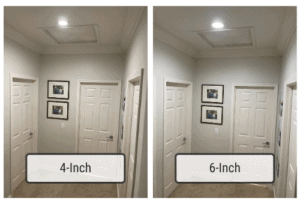As a lighting contractor, I help homeowners choose between 4-inch and 6-inch recessed lights on a daily basis. The decision can be somewhat stressful, since you don’t actually know how the lighting will look or work until it’s installed.
In this article, I discuss the differences between the two sizes, and how I arrive at my recommendations. I’ve also included decision trees for general, task, and accent lighting to make it simple for you to decide what’s best for your rooms.
3 Common Myths About 4-Inch Vs 6-Inch Recessed Lights
First off, I’d like to dispel a few common myths when comparing 4-inch to 6-inch LED recessed lights. These have not always been wrong, it’s just that modern LED recessed lights have changed everything.
Myth #1: Only 6-inch lights should be used for general lighting because 4-inch lights are not bright enough.
Fact: A minimum of 600 lumens is recommended for fixtures used for general lighting. In the past, 4-inch fixtures rarely produced that many lumens from the R20 or MR16 incandescent light bulbs they used. But with modern LED technology, most 4-inch LED recessed lights now meet or exceed this specification.
Myth #2: 4-inch recessed lights are too small to be used for General Lighting.

Fact: The spread or distribution of the light is primarily determined by the beam angle of the lens, not the size of the recessed light. In the picture show here, you can see a comparison between a 4-inch and a 6-inch recessed light with the same beam angle. Notice where the cone of light starts at the top of the wall. There’s very little difference (if any) between the two sizes.
Myth #3: You should always use the same size throughout your home.
Fact: Style should be consistent, but consider size and type on a functional basis. It is perfectly acceptable to mix 4-inch and 6-inch recessed lights in the same room.
In the example shown here, 6-inch lights are being used for general lighting, and 4-inch lights for accent lighting.
What’s The Difference Between 4-Inch And 6-Inch Recessed Lights?
Besides the physical size difference, 4-inch and 6-inch lights can be compared in terms of their style and function.
4 Inch Lights
Style – 4-inch lights lights are generally considered more modern than 6-inch lights because of their compact size.
Function – 4-inch lights often have more options for gimbal and specialty trims used for task and accent lighting applications.
6 Inch Lights
Style – 6-inch lights can appear more proportionate for mid-size and large rooms where 4-inch lights can look under scale for the room.
Function – 6-inch lights usually have a higher lumen output than 4-inch lights and a wide beam angle which makes them idea for general lighting.
What’s A Better Choice For Your Room?
To choose between 4-inch vs 6-inch lights for a room, first determine which lighting layers the room needs; General, Task, and/or Accent lighting. Then plan each layer separately.
Since all rooms need general lighting, I like to start with that first. Then you can add additional task lighting (if necessary), and finally accent lighting if appropriate for the room.
I’ve created a decision tree that will walk you through my recommendations based on your room. You can tap or click on each one to enlarge it.
